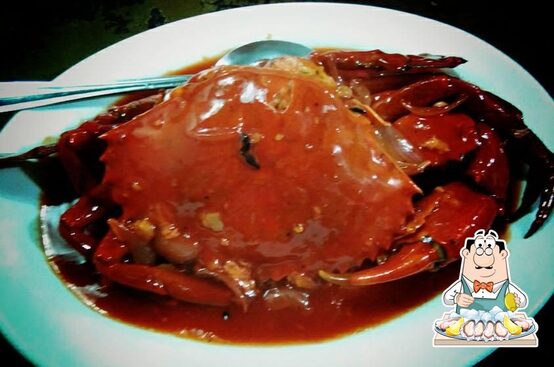A Taste Of Friendship: Exploring India-Myanmar Cuisine

Table of Contents
Shared Spices and Ingredients: The Foundation of India-Myanmar Cuisine
The foundation of India-Myanmar cuisine lies in its shared spice palette. Turmeric, chili, coriander, cumin, and mustard seeds – staples in Indian cooking – play equally prominent roles in Myanmar's culinary traditions. This shared spice heritage is a direct consequence of historical trade routes that connected the two regions, facilitating the exchange of not only spices but also culinary knowledge.
- Dishes showcasing shared spice usage: The rich, aromatic broth of Burmese mohinga, Myanmar's national dish, echoes the depth of flavor found in many South Indian fish curries. Both often utilize a similar blend of turmeric, ginger, garlic, and chilies, creating a harmonious balance of heat and warmth.
- Variations in spice intensity and blending techniques: While the core spices are shared, the intensity and the way they are blended differ significantly. Indian cuisine often features a more complex layering of spices, while Myanmar's culinary tradition sometimes emphasizes a simpler, more direct approach.
- Historical trade routes: The ancient trade routes that crisscrossed the region, particularly through the Bay of Bengal, played a vital role in disseminating spices and culinary traditions between India and Myanmar, forming the bedrock of their shared culinary heritage.
Noodle Delights: A Culinary Bridge Between India and Myanmar
Noodles are a culinary staple in both India and Myanmar, forming a delicious bridge between these two cultures. While the types of noodles and preparation methods may vary, the fundamental concept of a satisfying noodle dish remains consistent.
- Comparison of noodle dishes: Burmese ohno khauk swe, a rich coconut milk-based noodle soup, can be compared to the delicate South Indian Idiyappam, a string hoper served with flavorful curries. Both dishes demonstrate the versatility of noodles in creating hearty and satisfying meals.
- Different types of noodles: Rice noodles are ubiquitous in Myanmar, lending a light and delicate texture to many dishes. India boasts a wider variety, including wheat noodles used in preparations like sev puri, highlighting the diverse noodle traditions.
- Variations in sauces and toppings: The sauces and toppings are where the true differences shine. Ohno khauk swe's savory coconut milk broth stands in stark contrast to the vibrant chutneys and sambars that often accompany Idiyappam.
Vegetarian Delights: Exploring Plant-Based Cuisine
Both Indian and Myanmar cuisines offer an abundance of vegetarian options, reflecting the influence of Buddhism in Myanmar and the long-standing vegetarian traditions within Hinduism.
- Shared vegetarian dishes: Lentil-based curries, a mainstay in both cuisines, showcase the shared appreciation for legumes as a protein source. The variations in spices and preparation methods create unique flavor profiles.
- Use of vegetables and regional variations: The diversity of vegetables utilized in these cuisines adds another layer of complexity. Myanmar often incorporates local produce, leading to unique vegetarian dishes unavailable elsewhere.
- Role of vegetarianism: Vegetarianism holds significant cultural and religious importance in both countries, shaping the culinary landscape and creating a rich tapestry of plant-based culinary traditions.
Sweet Treats: A Symphony of Flavors
The sweet delights of India and Myanmar offer a delightful exploration of shared ingredients and contrasting flavor profiles. Coconut milk, jaggery (unrefined cane sugar), and various nuts form the backbone of many sweet dishes in both cultures.
- Similar sweet treats: The use of palm sugar, for example, appears in both Myanmar sweets and some traditional Indian desserts, highlighting a shared preference for this natural sweetener.
- Textural and flavor variations: While the core ingredients might overlap, the final product often varies significantly. The texture and flavor profiles of sweets in Myanmar tend toward a lighter, more delicate approach compared to the often richer, more intense Indian desserts.
- Cultural significance: Many of these desserts hold special cultural significance, marking festivals, celebrations, and religious occasions in both countries.
Modern Interpretations: Fusion Dishes and Culinary Innovation
Today, chefs are creatively blending traditional Indian and Myanmar flavors to create innovative fusion dishes. Globalization has further spurred this culinary cross-pollination, leading to exciting new interpretations of classic recipes.
- Examples of innovative fusion dishes: Imagine a Burmese mohinga broth infused with Indian spices, or an Indian dosa filled with a flavorful Myanmar curry. The possibilities are endless.
- Appeal of fusion cuisine: This fusion cuisine appeals to adventurous palates, offering a unique culinary experience that marries the best of both worlds.
- Creativity and evolution: The ongoing evolution of India-Myanmar cuisine is a testament to the enduring power of cultural exchange and the boundless creativity of chefs.
Conclusion
The culinary landscape of India and Myanmar reveals a fascinating story of shared heritage and intertwined flavors. The common thread of spices, ingredients, and culinary techniques demonstrates the deep cultural connection between these two nations. From the aromatic spices that form the base of many dishes to the delightful variations in noodle preparations and sweet treats, India-Myanmar cuisine is a testament to the enduring "Taste of Friendship." We encourage you to explore this rich culinary heritage further—try out some recipes, visit restaurants specializing in these cuisines, or delve deeper into the culinary history of the region. Discover the exciting world of India-Myanmar cuisine and savor the enduring taste of friendship!

Featured Posts
-
 Trips Activities And Events Calendar For Seniors
May 13, 2025
Trips Activities And Events Calendar For Seniors
May 13, 2025 -
 Sabalenkas Miami Open Victory A Match Report
May 13, 2025
Sabalenkas Miami Open Victory A Match Report
May 13, 2025 -
 Edinaya Rossiya Sbor Predlozheniy Dlya Predvybornoy Programmy Ot Deputatov
May 13, 2025
Edinaya Rossiya Sbor Predlozheniy Dlya Predvybornoy Programmy Ot Deputatov
May 13, 2025 -
 The Unending Nightmare Gaza Hostages And Their Families
May 13, 2025
The Unending Nightmare Gaza Hostages And Their Families
May 13, 2025 -
 Gibraltar Industries Nasdaq Rock Earnings Preview And Stock Outlook
May 13, 2025
Gibraltar Industries Nasdaq Rock Earnings Preview And Stock Outlook
May 13, 2025
